Singapore—The profile of women who come to the country as brides of Singaporean men has changed over the years.
According to data released by the Ministry of Social and Family Development (MSF) on Thursday (Apr 22), more of the non-resident brides are older and better educated than in previous years.
Non-resident brides are those who are neither Singaporean citizens nor permanent residents.
In 2019, the median age of non-resident brides was 29, whereas 10 years ago it was 27.
In 2000, it was 26.1.
As for brides younger than 25, their number has also decreased. In 2000, 36 per cent of foreign brides had not yet reached the age of 25, while in 2019, only 12 per cent of them were in this age bracket.
As for educational attainment, 66 per cent of the non-resident brides in 2019 had a post-secondary or university education, whereas only 36 per cent of the non-resident brides in 2000 had the same qualifications.
The data also shows that over 90 per cent of the brides are from other Asian countries.
According to analysts, the changes in the bride’s profiles reflect economic growth throughout Asia.
The ministry publishes data on marriages and divorces to increase awareness of family trends and issues as well as to encourage research, a spokesman told The Straits Times (ST).
As more Singaporeans travel, study or work in other countries, more citizens marry spouses who are foreign. The year 2019 saw a 15 per cent increase from 2000 of Singaporean men marrying a non-resident bride. Two years ago 4,426 Singaporean men married women from overseas, while in 2000, there were only 3,834 such marriages.
ST quoted Professor Paulin Straughan, a sociologist at Singapore Management University, who commented on how transnational marriages have changed.
“When we mentioned foreign brides (in the past), we thought of women with low socio-economic status from the region who enter into marriages because of their families’ financial circumstances.”
However, economic growth in the region has helped bring about changes, as women have had better educational and economic opportunities.
Older and better-educated brides are expected to have fewer conflicts than their younger counterparts in times past. They are likely to have better jobs, and therefore fewer tensions with their spouses over financial matters.
“The certainty over their residency in Singapore also gives a sense of belonging and enables them to play their marital and parenting roles better, which is important for building a strong family,” ST quotes a representative from an organisation that holds marital programmes for transnational couples, Fei Yue Community Services, as saying.
/TISG

